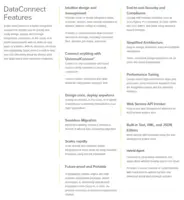Overview
What is HCL DataConnect?
HCL DataConnect (formerly Actian DataConnect) is a hybrid integration solution that enables users to integrate anything, anywhere, anytime. It can be deployed in on-premise, cloud, and/or hybrid environments and offers quick onboarding. With its emphasis data quality, data reuse, adaptability…
Recent Reviews
Product Details
- About
- Competitors
- Tech Details
What is HCL DataConnect?
HCL DataConnect (formerly Actian DataConnect) is a hybrid integration solution that enables users to integrate anything, anywhere, anytime. It can be deployed in on-premise, cloud, and/or hybrid environments and offers quick onboarding. With its emphasis data quality, data reuse, adaptability and self-service integration, DataConnect is designed to support rapid onboarding and deliver the fast time to value.
HCL DataConnect Features
Data Source Connection Features
- Supported: Connect to traditional data sources
- Supported: Connecto to Big Data and NoSQL
Data Transformations Features
- Supported: Simple transformations
- Supported: Complex transformations
Data Modeling Features
- Supported: Data model creation
- Supported: Metadata management
- Supported: Business rules and workflow
- Supported: Collaboration
- Supported: Testing and debugging
Data Governance Features
- Supported: Integration with data quality tools
- Supported: Integration with MDM tools
Additional Features
- Supported: Design and management intuitiveness
- Supported: Connect anything
- Supported: Design once, deploy anywhere
- Supported: Migration
- Supported: Data profiling
- Supported: Data Quality
- Supported: Scales rapidly
- Supported: Future-proof and Portable
- Supported: End-to-end Security and Compliance
- Supported: Simplified Architecture
- Supported: Performance Tuning
- Supported: Web Service API Invoker
- Supported: Built-in Text, XML, and JSON Editors
- Supported: Hybrid Agent
HCL DataConnect Screenshots
HCL DataConnect Competitors
HCL DataConnect Technical Details
| Deployment Types | On-premise, Software as a Service (SaaS), Cloud, or Web-Based |
|---|---|
| Operating Systems | Windows, Linux |
| Mobile Application | No |
| Supported Countries | North America, Europe, Asia-Pacific |
| Supported Languages | English |
HCL DataConnect Customer Size Distribution
| Consumers | 0% |
|---|---|
| Small Businesses (1-50 employees) | 20% |
| Mid-Size Companies (51-500 employees) | 40% |
| Enterprises (more than 500 employees) | 40% |









